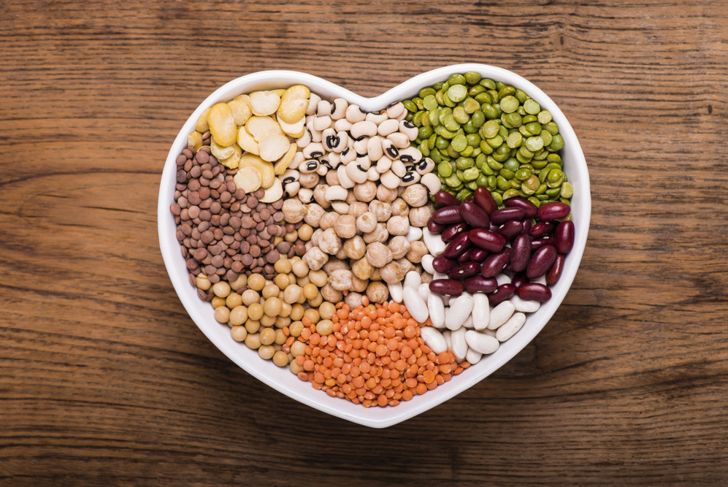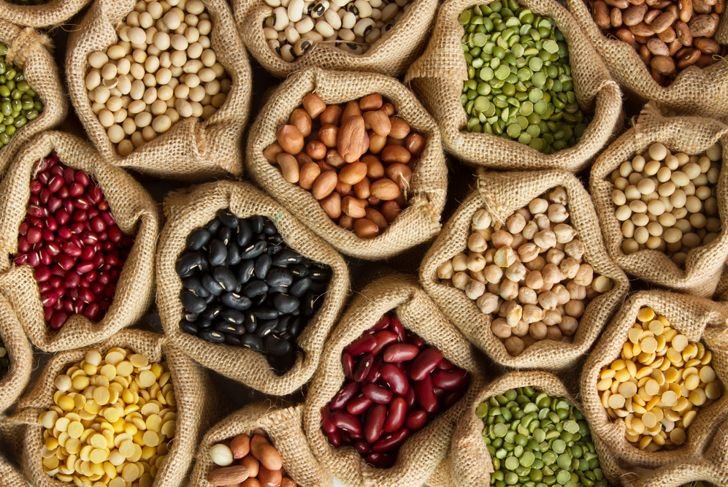Legumes are an incredibly nutritious category of food, which every person should be incorporating in his or her diet. Legumes, which include beans, lentils, peas, and peanuts, are incredibly versatile. Beans come in many different shapes, sizes, and colors, and they readily absorb flavors from the spices and herbs you choose to cook them with. Legumes are rich in many essential macro- and micro-nutrients including fiber, protein, iron, folate, calcium, magnesium, phosphorus, potassium, riboflavin, thiamin, vitamin B6, zinc, and many more vitamins and minerals.
Prevent Heart Disease
Legumes are rich in many nutrients which benefit heart health by lowering both cholesterol and blood pressure levels. Beans, lentils, peas, and peanuts are all excellent sources of dietary fiber. One cup of cooked kidney beans contains 16.5 grams (g) of fiber (66% of your recommended daily intake), one cup of lentils contains 15.6g of fiber, one cup of peanuts has 11.7g of fiber, and a cup of green peas contains 8.8 g of fiber.Fiber helps to lower cholesterol levels by binding to the cholesterol and pulling it out of the body before it has a chance to enter the bloodstream and build up on the inside of blood vessel walls. High cholesterol doubles the risk of heart disease, heart attack, and stroke.Legumes are also an excellent source of potassium—especially lentils and beans. Potassium is an important nutrient for balancing blood pressure levels because it balances the effects of sodium. Chronically high blood pressure (hypertension) is known as the “silent killer” because there are virtually no symptoms and over time, high blood pressure can lead to many serious health issues including heart attack, stroke, aneurysm, heart failure, and more.
Improve Digestion
That fiber we were talking about earlier— it’s good for more than just heart health. Fiber is a necessary component of healthy digestion. It absorbs water and bulks up the stool, making its trip through the digestive tract quick and easy. It helps to prevent bloating, gas, cramping, and constipation. Fiber also helps to balance out the pH levels in the gut, making a healthy environment in which good gut bacteria can thrive.
Promote Weight Loss
Most health experts will tell you that the key to maintaining a healthy weight is a plant-based diet. Plants contain many essential nutrients that we need for proper functioning of all systems, including vitamins, minerals, antioxidants, fiber, and protein. Studies show that people who eat plant-based diets are at a significantly lower risk of health conditions such as obesity, diabetes, heart disease, metabolic syndrome, and others. Legumes are high in fiber, so they’ll leave you full and satisfied for a long time after eating. When you eat foods that are rich in fiber, you’ll be less likely to snack in between meals.
Support a Healthy Pregnancy
Legumes contain many nutrients which are important for a healthy pregnancy including vitamin B9—also called folate, or folic acid—as well as iron, protein, and fiber. Folate is an especially important nutrient during pregnancy because it is necessary for red blood cell production, nervous system development, and regulation of gene expression. Research shows that folate deficiency can cause severe congenital disabilities known as neural tube defects such as spina bifida.Iron is found in red blood cells, which are responsible for transporting oxygen from the lungs to the rest of the body—including to the fetus. Iron deficiency can lead to anemia, a condition in which there are not enough healthy red blood cells in the body. This can be dangerous for a pregnant woman and her growing baby. One cup of lentils provides 90% of your RDI of folate, 37% of your RDI of iron, 63% of your RDI of fiber, and 36% of your RDI of protein.
Improve Nutrient Absorption
Legumes are high in fiber, which means that they help to keep the digestive system running smoothly. When the digestive tract is free from the trapped stool, it can function optimally. All of the nutrients from the foods we eat go through our digestive tract before they are absorbed into the bloodstream. The healthier the digestive system, the more nutrients are absorbed.Also, because legumes have such a varied nutritional profile, they contain many nutrients which work well together and increase the absorption of one another.
Control Diabetes
Most legumes fall into the “low” category on the glycemic index (GI). The GI dictates how quickly the sugar will be absorbed from each food you eat. Foods which are high on the GI cause spikes in blood sugar which is unhealthy for everyone—especially for those who are diabetic or prediabetic.The amount of fiber in the legumes helps to regulate blood sugar by slowing its absorption into the bloodstream.One study showed that adding chickpea flour to spaghetti significantly lowered its glycemic index score when the blood sugar of the volunteers was checked after their meal.
Prevent Anemia
Legumes are some of the best plant-based sources of iron. Lentils are the best source, with 6.6 mg of iron per one-cup serving. Kidney beans contain 5.3 mg of iron per one-cup serving, and peas contain 2.5 mg of iron per cup.About 70 percent of the iron in your body is found in the red blood cells, which transport oxygen from the lungs to all of the organs throughout the body. Iron deficiency can lead to anemia, symptoms of which include fatigue, lightheadedness, dizziness, weakness, pale skin, and insomnia.
Build Strong Bones
While calcium is important for bone health, it isn’t the only nutrient necessary for maintaining bone density. Legumes are rich in many nutrients which are important to bone health including calcium, magnesium, manganese, vitamin K, phosphorus, and protein.It is especially important for post-menopausal women to focus on eating foods which support bone health. According to the Centers for Disease Control and Prevention (CDC), a quarter of all women over the age of 65 have osteoporosis.
Boost Brain Health
After beef liver and salmon, legumes are the best sources of an essential nutrient called choline. Choline is a vitamin-like compound that was only named an essential nutrient in 1998. It is important for many functions including brain development, nerve function, muscle movement, metabolism, and liver function.One cup of cooked chickpeas contains 198 mg of choline, which is 36% of your RDI. A one-cup serving of split peas has 188 mg of choline. The same serving of navy beans contains 181 mg of choline.
Great Source of Plant-Based Protein
Legumes are an excellent source of plant-based protein. So grab a bag of beans and make a vegetarian chili this Meatless Monday.The following list includes the amount of protein per one-cup serving.
Peanuts: 34.6g
Lentils: 18g
Kidney beans: 16.2g
Black beans: 15.2g
Lima beans: 14.7g
Chickpeas: 14.5g
Peas: 8.6g

 Home
Home Health
Health Diet & Nutrition
Diet & Nutrition Living Well
Living Well More
More




















